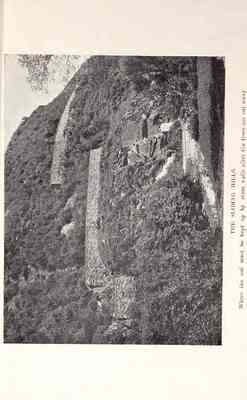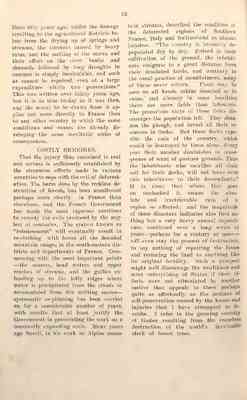Pages
10
ever cut down." But unhappily it is not necessary to limit ourselves to conjecture as to what may happen in extreme cases of this kind. In at least one country in modern times we have seen exemplified on the largest conceivable scale the terrible consequences of deying the ordinances of Nature by destroying the forests and neglecting to replace them. "China," writes Mr. Emerson Hough, dealing with "The Slaughter of the Trees" in "Everybody's Magazine" (May, 1908), "is the best instance of aland that never cared for forestry. She builds houses now of little poles, uses for fuel saplings, shrubs, herbage. Her children literally comb the hillsides for bits of roots and shrubs for fuel and fodder. The land is bared to the bone. It is a land of floods. Villages are swept away, hard-tilled fields ruined. Starvation always stalks in China. Alternate floods and water famines follow the waste of forests." The most striking illustration of these evils in the history of China is the record of the Hwang-Ho, the great Yellow River which drains the Northern Provinces, and twice within the last forty years has flooded vast areas of nesely peopled country, destroying millions of the inhabitants in a few hours. In the great flood of 1868, and again in 1887, the Hwang-Ho is credited with something like seven million victims; and considering that the floods covered ten thousand square miles of territory, studded with 3000 villages, the estimate is probably not excessive. Possibly the illustrations to this paper-some of which were submitted to Congress by President Roosevelt, with his last Message, in which he dealt with the necessity for reforesting the United States-may give some faint idea of the ruin and desolation that thus inevitably follow the Passing of the Forest. In China the work of destruction is still going on. The Hwang Ho is periodically flooded, and millons of lives are sacrified simply because the forests in Northern China have been cut down and never replaced. "They cut off the trees then the shurubs, then the grass until not a single living thing remained on the mountain sides. The rain washed the soil from the rocks. With infinite patience every year they build terraces wherever they can to save a little of the soil for agriculture. The once fertile valley lands are covered with gravel and rocks, the debris of floods. The territory that was once fertile is now bare, its flourishing cities are falling into decay, the land is becoming uninhabitable." And all this devastation and waste of property and life, and this destruction of man's handiwork have been due to the reckless cutting down of forests. The picture of desolation that some of these illustrations reveal may stand as a general type of the effects of deforestation in all countries in varying degrees. The loss of fertile soil, the submergece of productive land under a superincumbent load of barren debris and detritus from the hillsides, the choking of river beds, the diversion of reivers from their courses, and the disastrous floods that inevitably follow such changes-all these evils are in every land the direct consequence of the wholesale extirpation of timber trees.
WHAT OTHER COUNTRIES SUFFER.
It would be easy to accumulate great masses of evident of a character similar to the foregoing, but I may content myself with a few typical instances. In Stanford's "Compendium of Geographay and Travel," I find the following reference to Cyprus in regard to deforestation and its effects:-"The disappearance of the woods, now reduced to about 400 square miles in the southern uplands, has seriously affected agricultural prospects. With the forests went the soil which was washed down to the plains, choked the river beds and formed malarious swamps; the hills became bare rocks incapable of growing a blade of grass, and the locust at once took possession of the barren ground; whilst the absence of trees deprived the earth of its annual fertilising leaf mould. There is now stony desert at the S.E. end
[Illustration]
THE SLIDING HILLS.
Where the soil must be kept up by stone walls after trees are cut away
This page is blank
11
of the island, where tradition says there was formerly a large forest." The same story might be told even more forcibly of Asia-Minor, once the garden of the world, filled with densely-peoled towns, now for the most part treeless, waterless, sterile, and almost depopulated. Of Spain it has been said that the loss of her wealth and power, and the decay of her Empire, were due more than anything else to the impoverishment of her soil through the destruction of her forests. Describing Central Spain Sir A. Ford writes: "The denuded tablelands are exposed to the fierce suns of the summer and to the fiercer snows and winds of winter, while the bulk of the peninsula offer a picture of neglect and desolation, moral and physical, which it is painful to contemplate. Extensive steppes and plans are burnt by the sun in summer and swept by the icy winds in winter; while rain is so rare in the tablelands that the annual fall does not exceed 9 inches, and there are districts on which no shower descends for eight of nine months together. The face of the earth is tanned tawny, and baked into a veritable 'terra cotta,' and everything seems dead and burnt as on a funeral pile." Mr G. Chisholm, one of the most eminent of living geographers, describing the basin of the Po, in Northern Italy, says of the risk of floods to which it is constantly exposed:- "These dangers have been much increased by the wanton destruction of the forests of the Alps and Apennines, for when the shelter of the woods is gone, the heavy rains of summer easily wash the soil from the slopes down into the rivers, and many an upland pasture has by this process been turned into bare rock." Referring elsewhere to the malarial swamps in North Italy, the same authority writes:-"Since ancient times, the extent of marsh has in many places been increased through the excessive clearning of mountain forests, causing rain-water to rush unchecked down the mountain siades, and the rivers to swell into devastating floods."
THE CASE OF FRANCE
But perhaps the best illustration of the evils and dangers to which all countries are exposed by the process of deforestation is to be found in the meteorological and topographical history of France during the past century. Dr. Croumbie Brown, in his work on "Reboissement (reforestation) in France," gives a complete account of the causes that led to the clearing of the forests in the Lower Alps and the Pyrenees, and the results that followed in the form of landslips and floods. The details that he gives of the devastations committed by the mountain torrents, augmention every year with the cutting out of forest and undergrowth form a picture that has been thruthfully described as appalling. "The disappearance of the forests from the mountains," writes Captain Campbell-Walker, "gave up the soil to the action of the waters which swept it away into the valleys, and then the torresnts, becoming more and more devastating, buried extensive tracts under their deposits, tracts which will probably be for ever withdrawn from agriculture." And not only has irreparable injury been thus inflected upong the country, but enormous losses of property, and even of human life, have been sustained as a direct consequence of these same baneful causes. During 1875 the loss of property in the South of France through floods was estimated by the State at £3,000,000, and in addition at least 3,000 people lost their lives. "The indirect results in the shame of temporary or permanent damage to agricultural districts by the deposit of stones and shingle brought from the mountains by the flood waters cannot be estimaged, still less damage to pastoral lands on the mountains themselves. It may be stated generally that the results of excessive clearing of forrests and abuse of pasturage on the French Alps and Pyrenees have reduced their capacity as a sheep and goat carrying area to such an extent that they cannot feed half the stock that grazed
12
there fifty years ago; whilst the damage resulting to the agricultural districts below from the drying up of springs and streams, the torrents cause by heavy rains, and the melting of the snows and their effect on the river banks and channels followed by long droughts in summer is simply incalculable, and such as cannot be repaired, even at a large expenditure within two generations." This was written over thrity years ago, but it is as true to-day as it was then, and the moral to be drawn from it applies not more directly to France than to any other country in which the same conditions and causes are already developing the same inevitable series of consequences.
COSTLY REMEDIES.
That the injury thus sustained is real and serious is sufficiently establsihed by the strenuous efforts made in various countries to cope with the evil of deforestation. The harm doen by the reckless destruction of forests has been manifested perhaps more clearly in France than elsewhere, and the French Government has made the most vigorous exertions to remedy the evils produced by the neglect of centuries. The system known as "reboissement" will evenutally result in re-clothing with forest all the denuded mountian ranges in the south-eastern districts and departments of France. Commending with the most important points --the sources, head waters and upper reaches of streams, and the gullies extending up to the lofty ridges where water is precipitated from the clouds or accumulated from the melting snows-- systematic re-planting has been carried on for a considerable number of years, with results that at least justify the Government in prosecuting the work on a constantly expanding scale. Many years ago Surell, in his work on Alpine mountain streams, described the condition of the deforested regions of Southern France, Italy and Switzerland as lmost hopeless. "The country is becoming depopulated day by day. Ruined in their cultivation of the ground, the inhabitants emigrate to a great distance from their desolated lands, and contrary to the usual practice of mountaineers, many of them never return. There may be seen on all hands cabins deserted or in reuins, and already in some localities there are more fields then labourers. The precarious state of these fields discourages the population left. They abandon the plough, and invest all their resources in flocks. But these flocks expedite the ruin of the country, which would be destried by them alone. Every year their number diminishes in consequence of want of pasture grounds. Thus the inhabitants who sacrifice all their soil for their flocks, will not leave even this inheritance to their descendants." It is clear that where this goes on unchecked it means the absolute and irretrievable ruin of a region so affected; and the magnitude of these disasters indicates also that nothing but a very heavy annual expenditure, continued over a long series of years--perhaps for a century or more-- will even stay the process of destruction, to say nothing of repairing the losses and restoring the land to anything like its original fertility. Such a prospect might well discourage the wealthiest and most enterprising of States if their efforts were not stimulated by another motive that appeals to them perhaps] quite as effectually as the insinct of self-preservation roused by the losses and injuries that I have attempted to describe. I refer to the growning scarcity of timber relstuing from the ceaseless destruction of the world's invaluable stock of forest trees.




